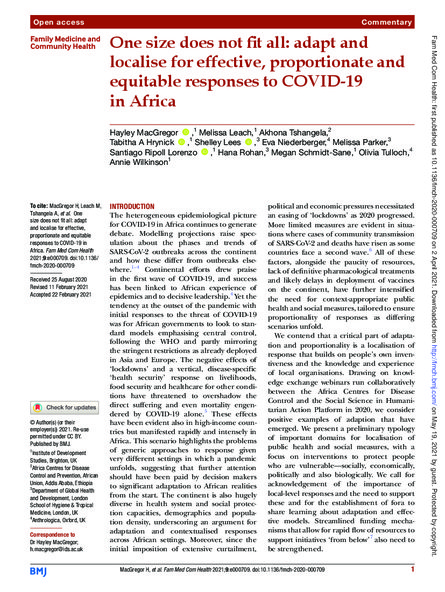
The heterogeneous epidemiological picture for COVID-19 in Africa continues to generate debate. Modelling projections raise speculation about the phases and trends of SARS-CoV-2 outbreaks across the continent and how these differ from outbreaks elsewhere. Continental efforts drew praise in the first wave of COVID-19, and success has been linked to African experience of epidemics and to decisive leadership. Yet the tendency at the outset of the pandemic with initial responses to the threat of COVID-19 was for African governments to look to standard models emphasising central control, following the WHO and partly mirroring the stringent restrictions as already deployed in Asia and Europe. The negative effects of ‘lockdowns’ and a vertical, disease-specific ‘health security’ response on livelihoods, food security and healthcare for other conditions have threatened to overshadow the direct suffering and even mortality engendered by COVID-19 alone. These effects have been evident also in high-income countries but manifested rapidly and intensely in Africa. This scenario highlights the problems of generic approaches to response given very different settings in which a pandemic unfolds, suggesting that further attention should have been paid by decision makers to significant adaptation to African realities from the start. The continent is also hugely diverse in health system and social protection capacities, demographics and population density, underscoring an argument for adaptation and contextualised responses across African settings. Moreover, since the initial imposition of extensive curtailment, political and economic pressures necessitated an easing of ‘lockdowns’ as 2020 progressed. More limited measures are evident in situations where cases of community transmission of SARS-CoV-2 and deaths have risen as some countries face a second wave. All of these factors, alongside the paucity of resources, lack of definitive pharmacological treatments and likely delays in deployment of vaccines on the continent, have further intensified the need for context-appropriate public health and social measures, tailored to ensure proportionality of responses as differing scenarios unfold.
We contend that a critical part of adaptation and proportionality is a localisation of response that builds on people’s own inventiveness and the knowledge and experience of local organisations. Drawing on knowledge exchange webinars run collaboratively between the Africa Centres for Disease Control and the Social Science in Humanitarian Action Platform in 2020, we consider positive examples of adaption that have emerged. We present a preliminary typology of important domains for localisation of public health and social measures, with a focus on interventions to protect people who are vulnerable—socially, economically, politically and also biologically. We call for acknowledgement of the importance of local-level responses and the need to support these and for the establishment of fora to share learning about adaptation and effective models. Streamlined funding mechanisms that allow for rapid flow of resources to support initiatives ‘from below’ also need to be strengthened.
This is a Family Medicine and Community Health publication originally published on BMJ Journals.